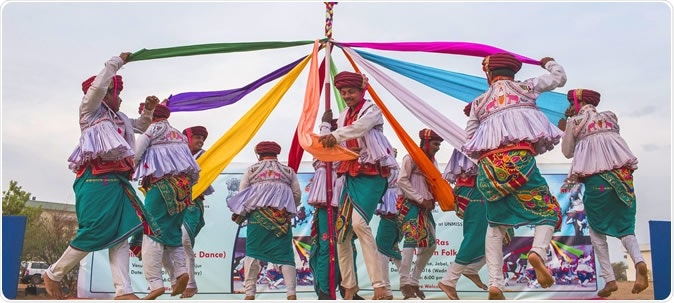The World Health Organization (WHO) has published a Health Evidence Synthesis report this week that has gathered evidence from a wide range of studies showing arts being beneficial to health. The WHO report suggests that all forms of art including visual arts, performing arts, literature etc. could be helpful in providing support in treatment and prevention of non-communicable diseases, neurological conditions and mental illnesses.

UN Photo/JC McIlwaine - An Indian dance is performed at the United Nations Mission in South Sudan.
For the purpose of the study the researchers classified arts into five categories including performing arts such as singing, dancing, acting etc., visual arts such as painting, pottery, knitting, crafts, design, photography etc., literature including poetry, prose reading, writing, attending literary festivals etc., culture including visiting galleries, museums, art symposiums, music conferences etc. and online arts including digital arts, design and animation.
The team at the WHO Regional Office for Europe included over 900 publications and reviews in scientific journals that included over 3,500 studies. The language chosen for the studies were English and Russian and time duration of the studies chosen for this analysis were between January 2000 and May 2019. All kinds of studies were included in the report. Some were case reports of individual cases, some were pilot studies, some were randomized controlled trials, some were small scale studies while others were longitudinal cohort studies that included large populations across nations.
Dr Piroska Ostlin, WHO regional director for Europe, in a statement said, “The examples cited in this groundbreaking WHO report show ways in which the arts can tackle 'wicked' or complex health challenges such as diabetes, obesity and mental ill-health. They consider health and well-being in a broader societal and community context and offer solutions that common medical practice has so far been unable to address effectively.” Authors of the study wrote in conclusion that evidence reveals that arts have a significant impact on “both mental and physical health.”
Among performing arts, waltzing lessons were found to be helpful for people with chronic heart failure by providing them with necessary aerobic exercise. Among other non-communicable diseases arts as therapy could benefit patients with asthma, respiratory diseases, heart disease and cancers, write the researchers.
The links between arts and health
Dance also helped patients with post-traumatic stress disorder (PTSD) by helping them relax their muscles due to stress and also reduced the stiffness and muscle pain seen in these patients known as “body armouring”. Children surviving the 2008 China earthquakes were found to do well after calligraphy training. Their stress levels and hyperarousal was found to be reduced after the training, found one of the studies.
Similarly, music for patients before and during surgery has been shown to reduce need for post-operative pain medication. Music also works well for neonates admitted in the neonatal intensive care units say researchers. Music and visual arts such as painting has been shown to help patients with dementia as well, wrote the researchers. In neurodevelopmental and neurological conditions such as cerebral palsy, autism spectrum disorders, strokes and degenerative neurological conditions, arts have been shown to provide significant benefits. Arts have found to reduce stress and also improve immune responses to diseases, finds the report.
Arts inclusion among children’s daily routine helps in myriad of ways write the researchers. This includes development of the child, early speech and language development, better educational acquisition and improvement of parent-child bonding.
Some of the evidence revealed that arts may even have a stronger impact on health compared to medication and exercise. Incorporation of arts in promotion of health also has economic benefits, wrote the researchers saying that these interventions maybe more cost-effective than other measures. Mild to moderate mental illnesses are cost-effectively managed using arts, the team wrote. In severe mental illness as well, arts could be used along with traditional medication and other therapies.
Festivals, carnivals, digital arts too play an important role in health promotion found evidence from the studies. Blind children from South India participated in a study for example where they were provided with singing toothbrushes. The quality of brushing and oral health improved among these children says this report.
Overall the arts as therapy raised resilience, social functioning, communication skills and physical abilities of the individuals. It has been seen that these promote health and well being and also improve the quality of life for the patient. Art therapy particularly is beneficial for palliative and end-of-life care and coping with bereavement as seen from evidence, wrote researchers.
Lead author of the study, Dr Daisy Fancourt, University College London, in her statement said, “This report highlights that engagement with the arts can affect social determinants of health, improving social cohesion and reducing social inequalities and inequities. Crucially, the arts can support the prevention of illness and promotion of good health.”
As a recommendation, the WHO report suggests that health and arts sectors need to be strengthened and brought together. Line of referral between the two needs to be established says the report. The report adds that since 2000’s nations including England, Ireland, Finland, Norway and Sweden have started on the policies to incorporate art and culture into the mainstream health promotion. Further research has been called for to establish the efficacy of arts in certain areas, says the report warning that arts may not be an answer to all diseases and traditional therapeutics play a main role in wellbeing with arts being an adjunct.